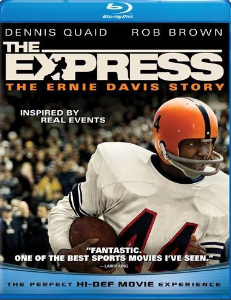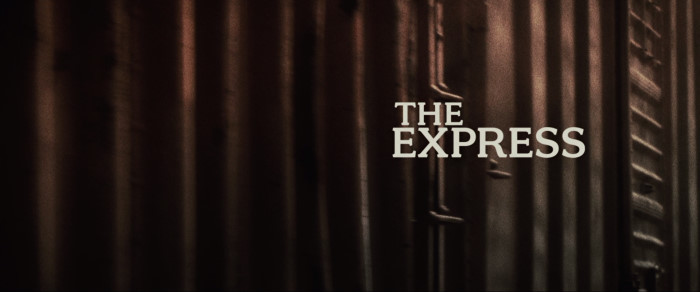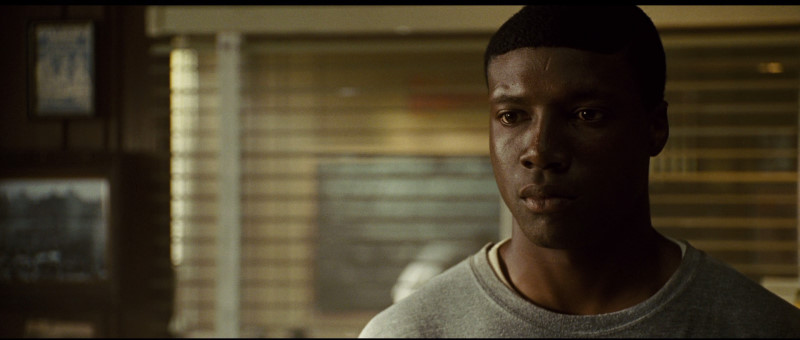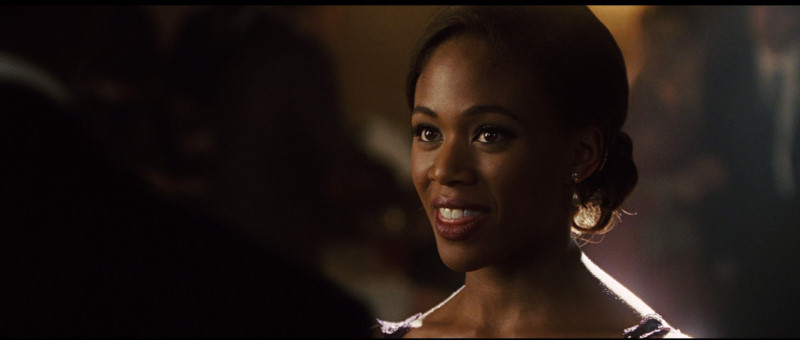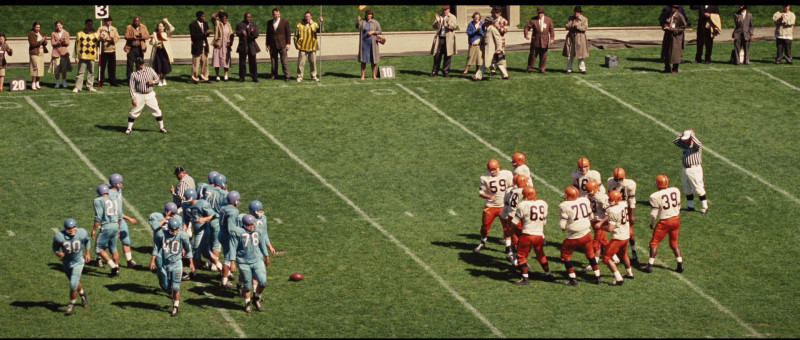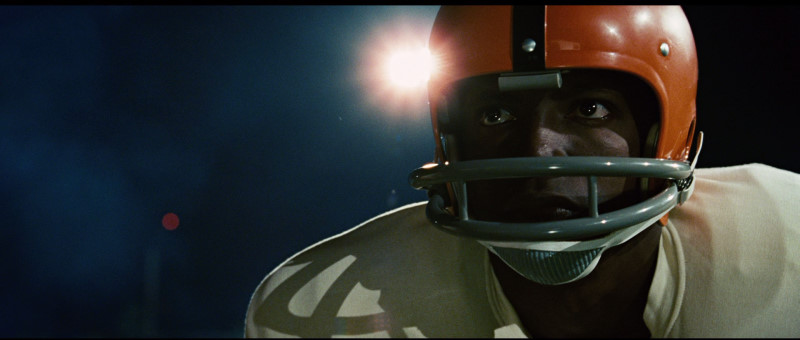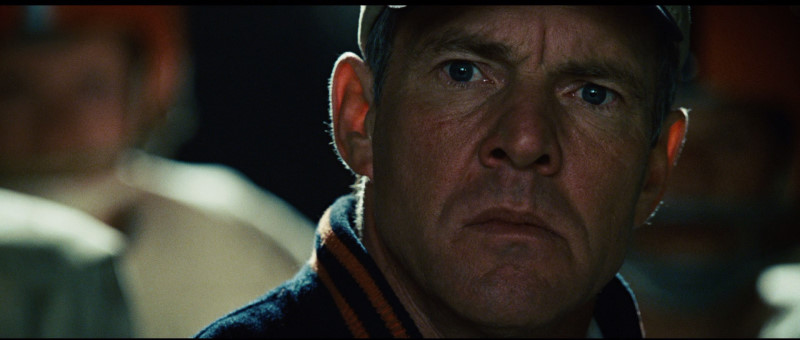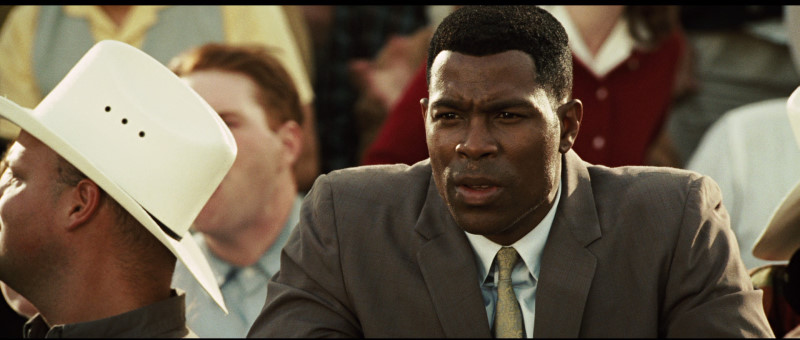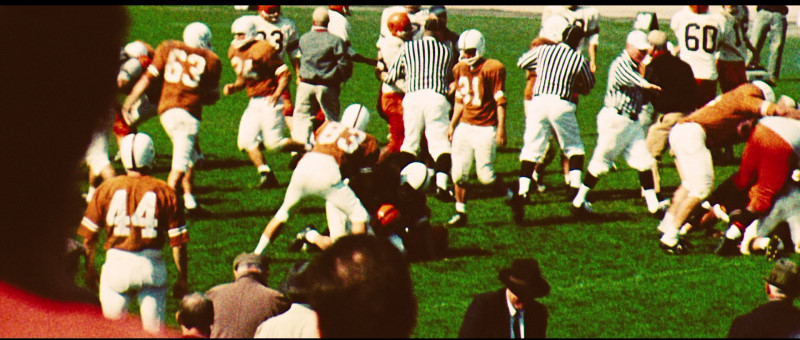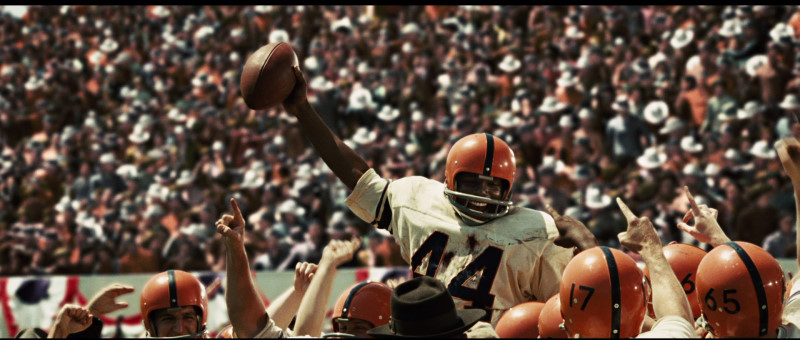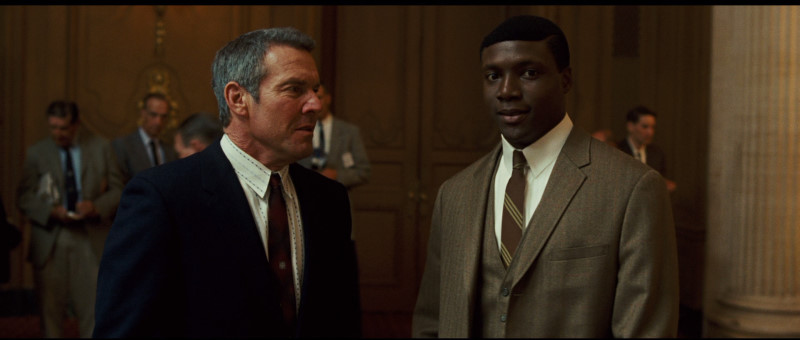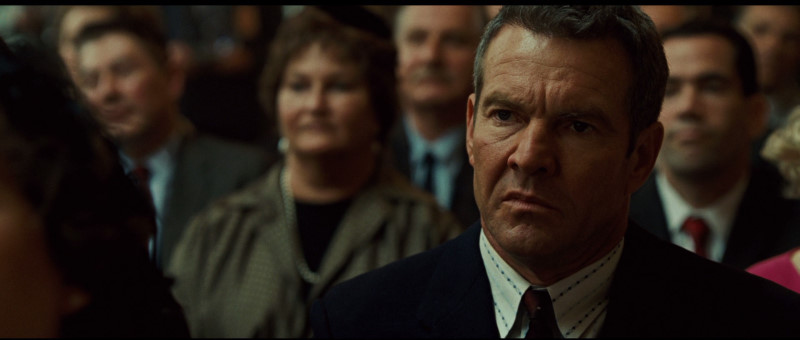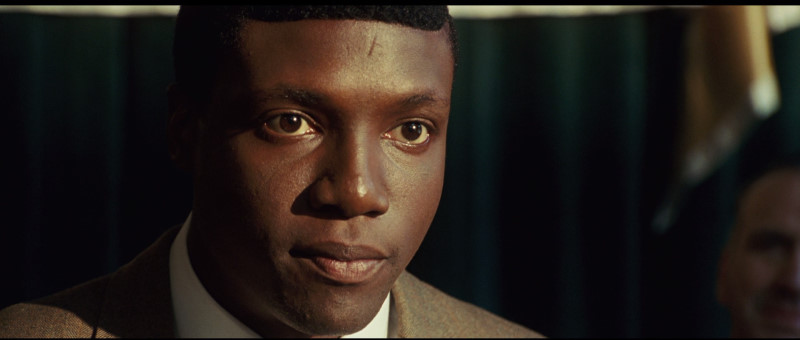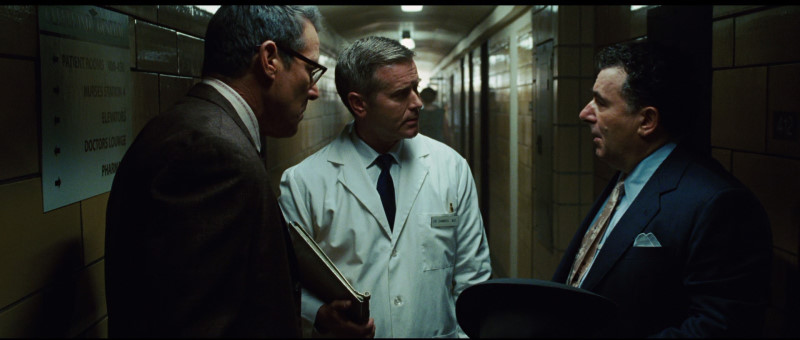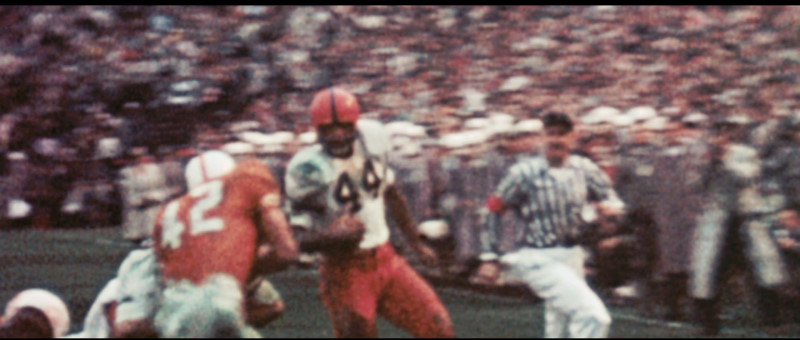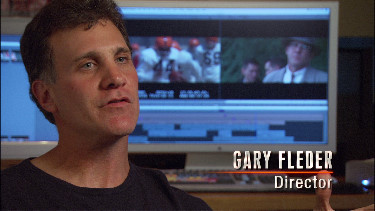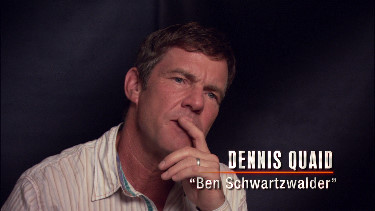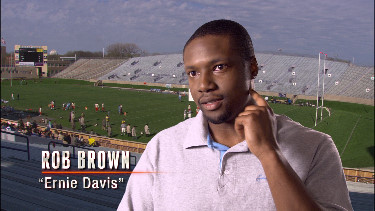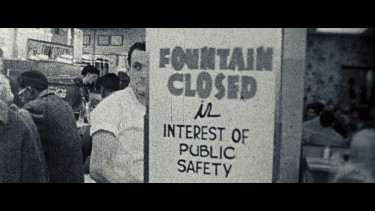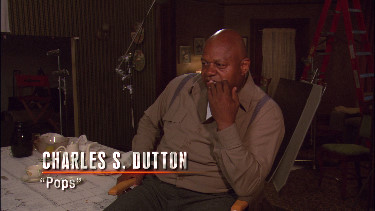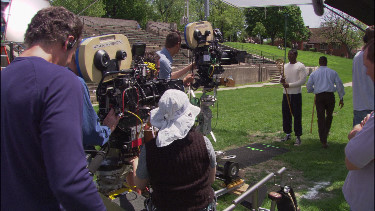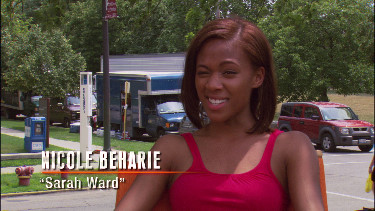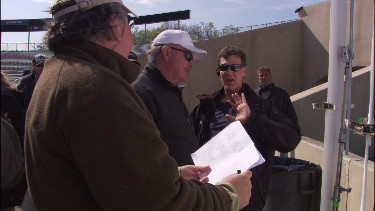|
The Express: The Ernie Davis Story [Blu-ray]
(Gary Fleder, 2008)
Review by Leonard Norwitz
Studio:
Theatrical: Universal Pictures, Relativity Media & Davis
Entertainment
Video:
Universal Studios Home Entertainment
Disc:
Region: FREE
Runtime: 1:51:22
Disc Size: 43,577,916,472 bytes
Feature Size: 36,214,241,280 bytes
Average Bitrate: 37.23 Mbps
Chapters: 20
Case: Standard Blu-ray case
Release date: January 20th, 2009

Video:
Aspect ratio: 2.40:1
Resolution: 1080p
Video codec: VC-1 Video
Audio:
D TS-HD
Master Audio English 4037 kbps 5.1 / 48 kHz / 4037 kbps /
24-bit (DTS Core: 5.1 / 48 kHz / 1536 kbps / 24-bit)
DTS Audio Spanish 768 kbps 5.1 / 48 kHz / 768 kbps / 24-bit
Dolby Digital Audio French 192 kbps 2.0 / 48 kHz / 192 kbps
/ Dolby Surround
Subtitles:
English SDH, French, Spanish, none
Extras:
• Making of The Express (13:57)
• Making History: The Story of Ernie Davis (13:18)
• Inside the Playbook: Shooting the Game (7:00)
• From Hollywood to Syracuse: The Legacy of Ernie Davis
(5:17)
Additional Extras (SD)
• Feature Commentary by Director Gary Fleder
• 3 Deleted Scenes w/ Optional Commentary by Gary Fleder
(7:37)
Exclusive to Blu-ray:
• 50th Anniversary of the 1959 Syracuse National
Championship (16:23) in SD
• BD-Live 2.0
Description: The true story of Ernie Davis, two-time
All-American running back for Syracuse University who led
his team to the national championship in 1960. In 1961, he
became the first black man to win the Heisman Trophy.
Comment:
Though the title clearly states "The Ernie Davis Story,"
in director Gary Fleder's hands, this really is the Ernie
Davis story. I'm not saying that it's especially close to
the facts, but that when Ernie takes the field, or when his
coach is working out plays and strategies, there doesn't
seem to be anyone else of consequence in the game. I
understand the impulse, but it sure goes some way to
undermine the concept of teamwork. The coach gives rousing
speeches to the team about the game and their place in
history, but once we get into a game, the camera and script
forgets that the game is a team effort.
That said, The Express is not just a football story, it's
front and center about racism in the early years of the
American civil rights movement. It's a story of how young
Ernie, his college coach, his school and his mostly white
teammates dealt with it and moved beyond it. Stereotypes are
less in evidence than we might expect. On the other hand, if
the behavior of the fans and opposing teams that Fleder
shows us is even half true, then things must have been
pretty scary. Jackie Robinson had already cracked
professional baseball ten years earlier (though major league
baseball didn't play in the South back then), but college
athletics were a pretty sorry state in regards integration.
The image of a continuous volley of cans and bottles thrown
from the stands as Ernie and his team enter the field in
West Virginia is likely to stick with you for a long time to
come.
Fleder acquits himself well in his development of the
relationship between Ernie (played by Rob Brown, whom you
may remember as the basketball player from Finding Forrester
nearly ten years ago. Brown was only 16 then) and his coach
(Dennis Quaid, who seems to be making a habit of appearing
in heroic sports movies.) Coach Schwartzwalder is presented
as more accepting of blacks than most in his time and place,
and though a generally good fellow, he was as likely
motivated by the necessity of assembling a winning team.
Syracuse wasn't the only college interested in Davis.
Whatever it takes, I say. Like many whites in the northeast,
Schwartzwalder's racism is so subtle, he is hardly aware of
it himself. So while he trains Ernie to be a better player,
Ernie teaches him something about how his passivity supports
the system. (It's a lesson that is explored effectively in
Elia Kazan's Oscar-winning Gentleman's Agreement at a time
when Jews were trying to break into a glass ceiling of their
own.) Quaid is superb here as he gives away very little to
an audience that isn't paying attention, so keep your eyes
and ears open.
As for the football segments, I can't say that the progress
of any given game is evident, but once the ball starts
moving we're pretty clear what's what and who's going where
and why. Still, highlights don't amount to much of a game,
so it's nice that we get to dwell on the Cotton Bowl
championship game itself.
The Movie :
7
The movie dramatizes the life of Ernie Davis, the first
black man to win the Heisman Trophy. Ernie, who was a
stuttterer, was raised with other children by his
grandparents in rural New York. When he was about ten his
mother returned to claim him and move to Elmira, where the
boy took his athletic gifts to the playing field. He
excelled in several high school sports, especially football,
where hardly anyone could lay a finger on him. He was
spotted by a scout and picked up by Syracuse who needed
someone to fill the shoes – and jersey, it turns out -
vacated by Jim Brown, recently drafted by the Cleveland
Browns.
When he was only a sophomore, the Elmira Express, as Ernie
Davis came to be known, would help spur the Syracuse
Orangemen to their first and, so far, only national
championship in 1959. He won the Heisman in 1961 and was
drafted by Cleveland, like his idol, Jim Brown. But before
he was able to take the field, Ernie was diagnosed with
leukemia. Despite the blow, Ernie's spirits remained high
and he became an inspiration to all, regardless of color.
Image : 8/8
NOTE:
The below
Blu-ray
captures were ripped directly from the
Blu-ray
disc.
The first number indicates a relative level of excellence
compared to other Blu-ray video discs on a ten-point scale.
The second number places this image along the full range of
DVD and Blu-ray discs.
Words that might describe the overall color deign of the
movie are ripe, unrestrained, and "stoned" - as in Oliver.
There are multimedia stretches right from the outset that
manipulate grain, contrast, saturation and color. But for
the most part, the image is just a little more saturated, a
little more contrasty than is natural – something that helps
this heroic story leap off the screen. When it suits the
desires of the director, the image is decisively sharp, so
we have reason to believe that the picture in general looks
as intended.
CLICK EACH
BLU-RAY
CAPTURE TO SEE ALL IMAGES IN FULL 1920X1080 RESOLUTION
Audio & Music:
9/8
Huge. Enveloping. Dynamic. Punchy. Crisp. Whether it's the
ambient environmentals of the locker room or the roar of the
crowd, the crunch of a block or tackle (pumped up to the
weight of contemporary standards to be sure), or the music
of an unseen jukebox, this DTS HD-Master Audio 5.1 mix rocks
and socks.
Operations: 5
The menu is laid out like other Universal Blu-rays.
Arrows tell you which way to direct your remote, and the
bonus feature instructions are detailed and intuitive. One
thing I came across I hadn't noticed on other Blu-rays
(though I may not have simply overlooked it) is that the
feature film audio commentary could not be accessed directly
by my remote. I was only able to get to it via the menu,
which, on a Universal Blu-ray, is several clicks away. Not
cool.
Extras: 7
Except for the deleted scenes and the documentary film
by Roger Springfield of the 50th Anniversary of the 1959
Syracuse National Championship, the remaining bonus features
are all in very good quality HD. "The Story of Ernie Davis"
is a collection of present day remembrances by people who
knew Ernie, including football great, Jim Brown. One has the
feeling that Fleder didn't go quite far enough in his
portrayal of Davis as an all around good guy. But it's the
50th Anniversary film that puts things in a fresh
perspective. While Fleder's movie makes it look like the
1959 Syracuse team was mostly a matter of Davis catching,
running and scoring, eight members of that team recall the
season that brought them to the Cotton Bowl – and they see
their season quite differently. Not that Davis wasn't
awesome (his name is mentioned a half dozen times - no more
than others), but the reason this team was so successful,
they observe, was that they had talent in depth. As one guy
said, the opposition would be advised that they shouldn't
try too hard to hurt the first string team because the
second string players were even better. Vintage highlights
of their season are liberally melded into the documentary.
Bottom line: 7
In the telling, there is hardly a sports cliché that isn't
invoked for all it's worth. On the other hand,
predictability comes with heroic territory. The racism angle
is the meat of the film, and I found it to be mixed bag. The
good parts have to do with Ernie and his coach. But Ernie's
adult relationship with his brother, Will, who introduces
him to the politics of racism struck me as forced onto a
movie already ripe with the Jackie Robinson story. Acting
kudos to Quaid, Charles S. Dutton as Ernie's supportive and
socially aware grandfather, and Omar Benson Miller as Jack
Buckley, Ernie's good humored teammate who shows him the
ropes and rules of being black in a white town. The visuals
are good, the audio even better.
Leonard Norwitz
January 16th, 2009
|
![]()
![]()

![]()
![]()
![]()
![]()

![]()
![]()
